Spotlight Interview with Daughters of Charity Services
Daughters of Charity Services
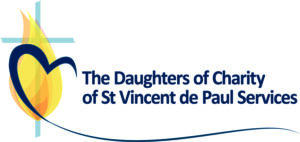
Comments from Mark Corea, Research and Policy Officer at Daughters of Charity Services
Daughter of Charity Services is a charity that works with people and the media to inspire content and communication that changes hearts and minds.
1. How are you helping to tackle child poverty in London?
One of the projects in our family, St Vincent's Family Centre, provides a range of services to families in need, particularly in the Westminster area. The services include a drop in and creche service, classes and therapy for families, as well as a food bank service. We also have projects serving people in need in Manchester and Glasgow.
At a head office level, tackling child and family poverty is one of the five priorities in our 2024–2027 strategy. We work in partnership with other charities, including members of the Catholic Social Action Network (CSAN), to raise awareness and influence policy through co-signing letters, policy papers, and working on campaigns together.
Later this year, we will also be launching a research project focusing on the lived experiences of families affected by poverty in London, based on the experiences of our projects and other data that we'll gather.
2. Tell us something you are excited about?
We have many things to be excited about at the Daughters of Charity Services. We recently launched our 'Emerging Poverties Briefing' through which we collate stories and updates on poverty in London and across the country and goes out to about 150 subscribers.
We are also excited to launch our paper on poverty among Asylum Seekers and Refugees, which discusses policy papers and other literature on this topic, to understand the causes and solutions to this poverty. Later in the year, we'll be launching a large research project on child and family poverty in the UK, as well as a smaller project on social care in Scotland.
3. Share with our members something positive about your organisation’s achievement or service?
Our member projects are diverse and span across the UK. Our Westminster-based social care service, Vincentian Care Plus, provides domiciliary care for Westminster City Council. For two years running, 2024 and 2025, they have won a High Commendation at the Homecare Awards for their work supporting people affected by homelessness at Edward Alsop Court in the London Borough of Westminster. The model of enablement they run is inspiring and we are extremely proud of their achievement and recognition for supporting vulnerable Londoners.
4. What can other network members learn from you or find out more about through you?
Other networks can learn about the Vincentian approach to serving the people most in need and the history of the Daughters of Charity in Britain. They are a truly unique group of women who have dedicated their whole lives to serving people in poverty, and we exist to continue their legacy. Our Vincentian Values ensure that all of our staff live this legacy out.
We run a variety of services throughout the UK, ranging from supporting vulnerable families and older people in Westminster to supporting Roma families in Glasgow and families of prisoners in Manchester.
Other Vincentian charities include Depaul UK, the Passage, and the St Vincent de Paul Society. These charities share the same ethos as us, and they all carry out great work in London and throughout the UK.
5. What would most help you achieve your goals?
As a small charity more collaboration with other charities would help us achieve our goals. We are proud to be part of some great networks, including 4in10, NCVO and the No Child Left Behind campaign, and Caritas Social Action Network. By joining up messaging and working together on campaigns with other charities of all sizes, it strengthens our voice as a small charity and we believe a united voice strengthens the message of our advocacy and campaigning.
6. Why did you join 4in10? What do you enjoy about being part of the 4in10 network?
We joined 4 in 10 as it is a large network of like-minded charities who are all keen to serve the most vulnerable in our society, which is our fundamental purpose. The events and the newsletter service are particularly helpful, as it makes it easy to network with charities across the city that serve people in need.
Spotlight Interview with Heard.
Heard
Comments from Becka Kellaway, anti-poverty campaigner and Aishah Siddiqa, senior programme manager at Heard
Heard is a charity that works with people and the media to inspire content and communication that changes hearts and minds. On a fundamental level, good communication means being heard and feeling heard. Using insights from research and our 15 years experience of supporting communicators, we help storytellers build their confidence, land their message and engage audiences. Our work has reached millions of people in their living rooms and on their newsfeeds.
- How are you helping to tackle child poverty in London?
Heard has been supporting organisations and campaigners working on a range of social issues including child poverty. We do this through our consultancy and training offers for sector partners andcampaigners with first hand experience, and through our bespoke workshops for the TV and entertainment industry. Our mission is to create conversations about social issues that change minds and develop the conditions for lasting social change. The long-term effects are two-fold: a public that is more receptive to and approving of policy change, and a new generation of individuals who feel inspired to act on our most urgent issues.
Becka - I hope I help by campaigning and raising awareness. I am more than happy to speak out about things that I see are unjust and I don’t mind sharing my personal experiences. I think others can feel silenced by stigma and shame so I believe it’s important to shine a light and make a difference where you can.
- Tell us something you are excited about?
Becka - I’m excited that there are more conversations happening around child poverty and ways to tackle it and I’m really very hopeful for the future.
Heard has also recently started a new piece of work exploring how a narrative change approach, informed by lived experience, can shift cultural perceptions of our economy. Often messages about economic change delivered by academics and people with economic privilege are limited in effectiveness. The majority of the country will relate more to people who share in their lived experiences of financial hardship and other forms of economic injustice. These are the people who should lead a new story about what our economy could be, and the systemic changes that need to happen to bring that change about. We’re looking for lived experience consultants to help us explore this and create a set of framing recommendations about the economy to share with other campaigners, partners and organisations in the ecosystem. If you’re interested in finding out more, please email aishah on aishah@heard.org.uk
- Share with our members something positive about your organisation’s achievement or service?
Becka - the best thing about this organisation is that it empowers people to tell their story bravely and it supports them throughout the process and helps to frame the narrative so we all feel safe in our work.

Together with other lived experience consultants, we co-designed the digital version of Heard’s poverty focussed ‘Communication That Works’ course. The course itself is a blend of self-directed learning on an online platform with live workshops running over several weeks covering ways to effectively frame communications on poverty and tools to keep safe when sharing stories in interviews and beyond. We ran a successful pilot at the end of last year with Becka brilliantly facilitating our live workshops. We’ll be making final tweaks before going live this summer.
“This Heard Training course has been profoundly informative and impactful, not only in reshaping my approach as a communications professional but also in influencing how I think about and discuss social issues in all areas of my life. The trainers were knowledgeable, confident and excellent facilitators. The video content was clear, easily digestible and engaging. Overall, the program was truly transformative.” - Fern Bain Smith, Marylebone Project
- What can other network members learn from you or find out more about through you?
Becka- They can learn from Heard’s example how to be a champion for people with lived experience
Becka is an amazing, energetic and thoughtful facilitator - reach out if you require someone sensitive and engaging!
- What would most help you achieve your goals?
Becka - Funding, opportunities, awareness, more people fighting the good fight and they can start by attending the training and being mindful and empowered advocates.
- Why did you join 4in10? What do you enjoy about being part of the 4in10 network?
Narrative change requires joined-up approaches - and we love being able to work with 4in10 and its members. The Challenge Poverty Weeks were great examples of this in action! If anyone would like to connect and chat about how we can collaborate, please do =D
Guest Blog with Z2K on the damaging impact of London's temporary accommodation crisis
 Photo by Cyrus Crossan on Unsplash
Photo by Cyrus Crossan on Unsplash
Hear from Louise* and Miracle, two peer researchers with lived experience of temporary accommodation (TA) who co-produced Z2K’s research report ‘Frozen in Time’. The researchers interviewed people living in TA in Westminster about the issues they face and the impact that living in TA is having on peoples’ lives. The research was launched last month at an event in Parliament hosted by Rachel Blake, MP for Cities of London and Westminster.
Miracle: My first experience of homelessness and temporary accommodation was in London during my late teens for about two years. For a young man with the ambition to hopefully do well in the world and succeed through education, those two years for me were really traumatizing (fighting forces of derailment with a strong will and focus to triumph through). The overall experience I had during that period of time involved living in bad housing conditions (mould, damp and pests) causing health issues, as well as the impact of burglaries. However, I went through adversity those two years and conquered it with cheerful spirits of hope for a better day someday. Since this time, I have had a nomadic existence because I had nowhere that I could call home in the UK. I moved from TA to a mixture of student accommodation and privately rented accommodation. More recently, I have found myself back in TA, placed in a hotel ‘out-of-borough’.
Louise: I lived in TA as a single parent placed out-of-borough. It felt like screaming in a sound-proofed room, hoping someone might hear. I felt exhausted from fighting to pin down who was responsible for the infestations and damp in the property. For my child, living in TA meant having a stressed mother whose spare time was spent chasing the council, growing up in an environment which did not allow pictures on the wall, pets, or any self-expression or personalisation – and no playdates due to the damp and disrepair.
Miracle: It has been a rewarding experience being a peer researcher on the Z2K temporary accommodation project. Working on the project and meeting like minds with shared experiences was for me a great opportunity to help dig into the heart of the TA experiences which many in Westminster are currently having. It has been satisfying to try to bring this reality closer to the eyes of decision-makers at Westminster City Council.
Louise: Interviewing people who had been placed in TA by Westminster City Council as part of the research project was the first time I had spoken to anyone else in TA about their experience, and the interviews immediately made me feel less isolated and more human again. I found it validating and cathartic to speak to others facing similar difficulties.
Miracle: It is clear to see from the findings that people living in Westminster TA desire more empathy and understanding.
Louise: In temporary accommodation you are always on the verge, on tenterhooks, never knowing when you’ll get told to leave. I felt helpless living out-of-borough, unable even to vote for the Westminster councillors who held my housing future in their hands. Then there is the stigma you fear if you share this with schools or GPs; the assumption you must have done something wrong to be in TA to begin with.
Miracle: There are a number of areas where change is needed, such as in the council’s engagement and communication with people.
Louise: All Westminster schools and GPs should read this report so they understand how TA affects their service users. Similar to my own experience, the vast majority of people I interviewed did not feel that their needs were met or understood. Whether it was complaints about damp and mould adversely exacerbating their health problems, or traumatised survivors of domestic abuse being placed in unsuitable accommodation, the common problem was the lack of communication and engagement on the part of the council. This left the interviewees, mostly women, feeling forgotten and as if they don’t matter.
Miracle: We need to see a change in the way in which people living in TA are often seen and treated.
Louise: The uncertainty and the worry of not knowing where or when they might be moved on caused families stress and insomnia, which affected their mental and physical health. This in turn affected school or work outcomes, despite trying their utmost to do well and succeed. Households needing temporary accommodation appear to be looked down on.
Miracle: For so many, living in TA is not temporary. Therefore, improving TA standards is surely an area where change is vital. I believe that the report will help to bring a dose of reality to the current understanding of temporary accommodation at Westminster City Council, so that there can be a different tomorrow.
Louise: I believe that if the council staff had carried out the interviews we did, and experienced the resilience and tenacity of these people, then they would treat them with more respect, inclusion and engagement. Meaningful dialogue, not stonewalling, is what is needed to free people living in temporary accommodation from the state of limbo that they find themselves in.
*Not her real name
Spotlight Interview with Give. Help. Share.
Give. Help. Share
Give. Help. Share. work to tackle food poverty in London.
- How are you helping to tackle child poverty in London?
At Give. Help. Share., we tackle child poverty in London by addressing two key issues: food insecurity and a lack of nutritional education. We provide free nourishing food bags to children and families in disadvantaged communities via a school distribution network across Greater London and Herts. In parallel, we also run hands-on healthy eating workshops in primary schools, empowering children to make better food choices and become 'food change champions' in their homes. Our lessons are designed to be accessible and impactful, helping to improve long-term dietary behaviours and break the cycle of poor nutrition linked to poverty.
- Tell us something you are excited about?
We’re really excited about the growing interest from corporate partners who want to support our mission. More businesses are now recognising the importance of tackling child poverty, and we’re running more corporate volunteering days where teams help pack and deliver nutritious food bags for disadvantaged families. These sessions don’t just provide vital hands-on support - they also open people’s eyes to the realities of food insecurity in their own communities. It’s been powerful to see whole teams get involved, learn more about the issue and leave feeling inspired to do more.
- Share with our members something positive about your organisation’s achievement or service.
One of the things we’re most proud of at Give. Help. Share. is that we’re a grassroots charity founded and run by qualified teachers who also hold Master’s degrees in Public Health and Health Promotion. This unique combination means we not only understand how to engage children in schools, but we’re also fully equipped to design and deliver evidence-based interventions that genuinely improve health outcomes. Thanks to this expertise, we’ve developed a six-week food education programme that’s already been delivered in over 100 primary schools. These engaging, hands-on sessions are helping children learn how to make healthier food choices and take that knowledge back to their families. It’s a sustainable, empowering approach that we hope will make a real difference in the fight against child poverty.
- What can other network members learn from you or find out more about through you?
Other members can learn from our experience in developing and delivering engaging, low-cost nutrition education, with a particular focus on how to reach children in disadvantaged areas in a meaningful, age-appropriate way. We’re also happy to share insights on mobilising volunteers, running corporate engagement days and building sustainable food support models that empower, not just provide. We’re always happy to collaborate, share resources and work with other organisations to amplify our overall impact on child health and poverty.
- What would most help you achieve your goals?
One of the biggest barriers we see is the rising cost of healthy food - it’s simply not accessible for all families, especially those already facing hardship. To truly tackle child poverty, we need systemic change, so to achieve our goals, we’d benefit most from:
- Sustainable funding to continue delivering food and education to the communities that need it most
- Government support and lobbying contacts to campaign for long-term solutions
- Policy change including making food education statutory in all primary schools, so every child learns essential skills for lifelong health, regardless of background
- Why did you join 4in10? What do you enjoy about being part of the 4in10 network?
We joined 4in10 because we wanted to be part of a collective voice challenging child poverty in London. As a small but growing charity, it’s important for us to connect with others who share our mission and values. We're new to the network but it feels like a brilliant space to exchange ideas, raise awareness of the work we’re doing, and stay informed about policy developments that affect the families we support. Thank you!
The tragic relationship between child poverty and homelessness in London
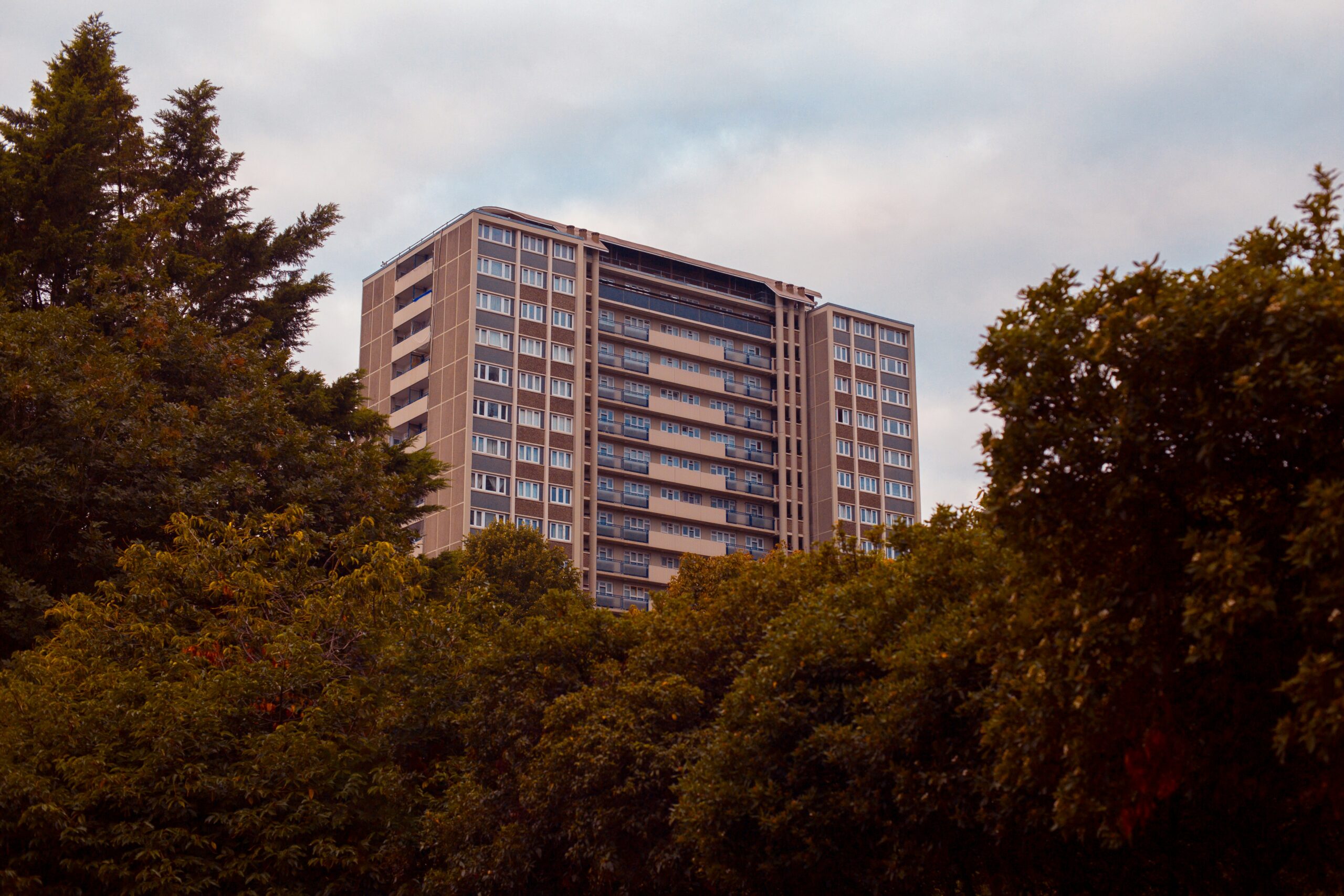 Photo by Pedro Ramos on Unsplash
Photo by Pedro Ramos on Unsplash
The threat of homelessness is an extremely visceral fear. The lack of a safe place to sleep, eat, shelter from poor weather and gather with those closest to us should be a basic right that every individual sees realised. However, for thousands of children their home is just a hope. In the meantime, they might sleep in mouldy, cold rooms, while sometimes sharing a hotel bed with several siblings with nowhere to play or do homework.
At the end of February this year, the government released new statistics for July to September 2024 showing that 70,450 households in London are in Temporary Accommodation. Focusing exclusively on all households with children across the country in TA, 58% are in London alone. As Shelter, recently highlighted, 164,040 children are currently in TA and 92,850 or nearly 3 in 5 children in TA are in London. These children are not well captured in HBAI data, which is used to create child poverty statistics for the country. That could mean that nearly tens of thousands of children are missing from the estimated 700,000 children believed to be in poverty across the capital. We also know that children are being moved outside of their local borough or even outside of the city entirely, but we don’t know how many.
With the equivalent of one child in every classroom in London currently living in temporary accommodation, and 14,885 young people presenting as homeless to their local council across the city in 2023-24 figures, it is clear that all levels of government across London must take the intersection of the housing crisis and child poverty very seriously.
Gathered evidence shows that child poverty can be a predictor for adult homelessness and is almost always a co-existing reality for families facing the threat of homelessness.
Trust for London’s 2022/23 data on child poverty rates after housing costs show significant jumps when housing costs are accounted for as the chart below shows. The affordable housing crisis in London and the hundreds of thousands of children experiencing poverty must be viewed in tandem. If we want to seriously prevent child poverty from causing long-term harm to children, we need to build appropriate, truly affordable homes fit for families who live in our community urgently.
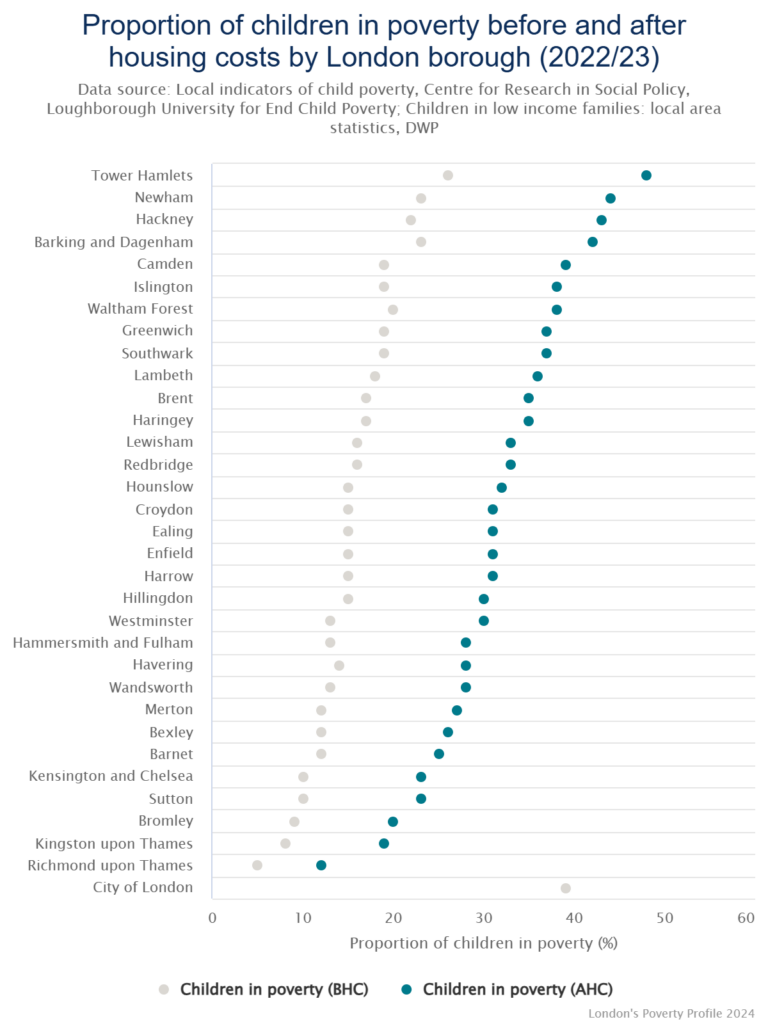
The challenge though to quickly improve the lives of families is to provide the services they need when the threat of homelessness first looms. There are particular groups who face specific barriers when navigating personal crisis. For a parent who is threatened with domestic violence or a single parent with threats from debt collectors or joblessness due to unpaid caring responsibilities, holistic support is needed to help prevent and reduce the likelihood that they are unable to stay or move into a permanent home quickly. Other families are essentially forced into homelessness after their application for asylum is approved and they’re granted refugee status. These families often have little to no social and financial capital. Those still in a visa application process also face costly fees and limited social security support should they need it. And if a person has grown up in poverty and either loses their home or must leave their current place as a young person, their age may limit both their eligibility for support and prioritisation for what little help they can request.
Effective interventions must tackle both the broad supply challenges as well as the specific individual circumstances of Londoners. If change isn’t built on understanding of individual needs, it will fail to create systemic change.
Certainly, the evidence is clear that building more truly affordable social housing is the cure. At the same time, we also need to inoculate ourselves against the disease of child homelessness in London urgently. This is a public health crisis and a moral indictment.
We are currently leading a project focusing on the key moments when homelessness should and could be prevented. We believe that some crucial conversations need to be had about protecting families from homelessness and providing appropriate support to shorten or prevent experiences of homelessness. The issues are complex, but inaction is costly. Children have significant health, academic and social risks if we do not act quickly. We’re privileged to be working with Cardinal Hume Centre and New Horizon Youth on this project. Together we’re gaining insight from three particular groups to understand what policies need to be put in place while the houses are still being built.
We’re currently interviewing young people with experience of homelessness as a minor or young adult, migrant families and single parent, women led families. We are holding these interviews across March and April. If you know of someone who might like to take part, please do get in touch.
We aim to share our findings in summer 2025 and invite political leaders and civil servants to engage in important conversations about how we can support families to reduce the backlog of cases where families are living in unacceptable circumstances and children are growing up without a home.
Spotlight Interview with Cash Perks
Cash Perks
Cash Perks way to get cash immediately to beneficiaries for hardship grants and other welfare payments.
- How are you helping to tackle child poverty in London?
Cash Perks is transforming the way hardship funds reach vulnerable families by providing instant, cash-first support. Our innovative payment solution allows councils, housing associations, charities and community organisations to instantly send emergency funds directly via SMS, which can be withdrawn 24/7 for free at thousands of ATMs nationwide without the need for a bank account or card. This ensures families in crisis can access essential financial support quickly and with dignity, reducing the stress and stigma often associated with traditional aid like food parcels or shopping vouchers.
- Tell us something you are excited about?
We’re excited about the growing adoption of Cash Perks by almost 50 organisations of all shapes and sizes across the capital. In London that includes leading councils such as; Barking and Dagenham, Camden, Haringey, RBKC and Lambeth through to diverse frontline charities such; Z2K, Wimbledon Guild, CAB Kensington and Chelsea, North Paddington Food Bank and Solace Women’s Aid.
Hearing the real -life benefit of our service—families getting the immediate support they need without unnecessary delays—is incredibly rewarding. When clients collect their money, we often embed surveys that help measure the impact and gain valuable insights and feedback such as this from someone receiving their funds – “Brilliant experience eternally grateful for the help escaping domestic violence & accessing help to move to a safe home. Really appreciated!”
- Share with our members something positive about your organisation’s achievement or service?
Within the next few weeks, we will reach a huge milestone of disbursing over £10 million of hardship funds directly to struggling families. It’s been an amazing journey from recognising there must be a better way of getting emergency financial support to people – especially those that are unbanked or in vulnerable circumstances to reaching this important landmark. We were also hugely honoured last year to win two awards, recognised by The Big Issue as one of their Changemakers 2024 and as the best Financial Inclusion Innovation at the nation Pay360 Awards.
- What can other network members learn from you or find out more about through you?
Like an increasing number of civil society organisations, we advocate for a cash-first approach to poverty relief, which research shows is the most effective way to support people in crisis. We’re happy to share our experiences with organisations looking to transition to cash-based support, helping them navigate concerns around security, fraud, and administration, while also reducing time and delivery costs and most importantly maximising the impact of their funds through engagement in longer-term holistic support.
- What would most help you achieve your goals?
Greater collaboration! The more organisations that embrace cash-first support, the bigger the impact we can have on tackling poverty. We’d love to connect with more charities, councils, and funders who are interested in partnership. Advocacy for direct cash assistance at policy levels would also help ensure more families receive the support they need in the most effective way possible.
- Why did you join 4in10? What do you enjoy about being part of the 4in10 network?
We joined 4in10 because we share its commitment to addressing child poverty in London. We hope that being part of the network allows us to collaborate with like-minded organisations, learn from others’ experiences, and advocate for systemic change. We love the sense of collective action and the opportunity to share insights on how cash-first solutions can play a key role in reducing financial hardship for families.
Visit to Restorative Justice for All
One of the best parts of the role of community outreach officer for 4in10 is the privilege of being able to visit our extraordinary members and this has led to some truly fantastic experiences.
Whether it is being part of the series of campaign events put together by Southall Community Alliance, watching the presentation of new bleed control kits, donated by anti-knife crime charity Bin Knives, Save Lives or being part of community information events run by Poplar Harca housing association, this job continues to give me the chance to really experience the hard work of our incredible membership and has given me a real sense of hope.
Given this I thought it would be good to write about one of these events to give you a flavour of the experience.
A couple of weeks ago I was lucky enough to visit Restorative Justice for All (RJ4All)’s Rotherhithe Community Centre whilst they were doing their Wellbeing Circle.
RJ4All is a charitable international institute with a mission to address power abuse, conflict, and poverty through the use of restorative justice values and practices. The RJ4All Rotherhithe Community Centre serves as a vital hub for community empowerment and social connection at the local level.
As RJ4All’s Community Centre is always doing events, so for me it was originally more the date I was available to go than what activity I was going to be part of, but I was so glad I chose that day!
When I arrived, I was instantly made to feel completely welcome and shown around their centre. This was a very friendly building made up of a few side rooms, an office, a small kitchen and a small meeting room with sofas, tables, chairs and toys for children.
I was the first visitor to join but the session quickly filled up and by the time we were ready to go there were maybe 10 of us (all women). It was only at this point that I was grew to understand the nature of the event.
Our team leader explained to us that the idea was that each week the wellbeing circle explored a thought-provoking topic with the leader posing questions within it. She then apologised as it was her first week – not that you would have known she was brilliant.
I would not say I was cynical about the model – group therapy has been shown to do some amazing things but I was unsure how I would find it with not knowing anyone or indeed anything about the event but any anxieties I had were soon to be proved wrong.
The topic under discussion was ‘forgiveness’. First we were asked to explain in turn what we understood forgiveness to mean and then went on to explore times where we had each grappled with forgiveness.
As we went round the circle the comments of my fellow participants began to really touch something in me and as the evening went on I found myself talking about things and feeling emotions that I would never have thought about. And this, plus being with others while they explored sometimes very personal things profoundly touched me.
I came away from that extraordinary event feeling incredible, refreshed and if possible lighter; like I had been on a big therapy session. I would recommend this experience to anyone!
RJ4All’s Wellbeing Circles promote its overall vision of building the world’s first restorative justice postcode by providing a first line of mental wellness support to the community, strengthening relationships within the area, and fostering community cohesion in SE16.If anyone else would like to learn more about RJ4All you can go to their website here [I’ll include a link when it goes live].
Jobs from latest newsletter (24/01/25)
The latest jobs from our brilliant 4in10 members.
|
Spotlight Interview with Be Enriched
Be Enriched
Be Enriched provides meals to families especially during school holidays.
-
- How are you helping to tackle child poverty in London?
Be Enriched addresses child poverty by ensuring that children and their families have access to nutritious, affordable food, especially during the school holidays when free school meal programs are unavailable. Through initiatives like the Food Bus, which serves groceries at reduced costs, and Kids Clubs providing meals and activities, we bring stability and joy to low-income families. Already this year, the Food Bus has served: 1,300 customers! That means we’ll serve over 7000 people over the next 3 years.
- Tell us something you are excited about?
We are thrilled to share our “Gifts That Give Back Christmas Appeal” campaign. This initiative will bring food, companionship, and holiday cheer to over 300 people during the festive season. Through community meals, The Food Bus Project, and special kids’ activities, we will ensure no one feels forgotten this Christmas. We are particularly excited about hosting three weekly community meals throughout December and January, spreading warmth and joy in the midst of challenging times.
- Share with our members something positive about your organisation’s achievement or service?
This year alone, we’ve already served 2,265 guests and provided 6,795 nutritious meals at our community canteens, as well as saving 2,159 kg of food from landfill. Last year, Be Enriched made a remarkable impact, serving nearly 10,000 meals and preventing over 6 tonnes of food waste. This year, 800 volunteers contributed over 4,800 hours to our community projects, showcasing the power of collaboration and shared purpose.
- What can other network members learn from you or find out more about through you?
Network members can learn about innovative ways to reduce food waste while addressing food insecurity and social isolation. Our Food Bus Project, which brings affordable groceries and community space to areas in need, and our Community Canteens, where volunteers create meals from surplus food, are models of sustainability and fostering community resilience. We are always eager to share insights into creating inclusive, sustainable initiatives that foster long-term connections and tangible change.
- What would most help you achieve your goals?
This Christmas, 1 in 5 Families will choose between heating and eating, and 1 in 10 Pensioners are set to spend the holiday in isolation. So, we’re calling on supporters to join our Gifts That Give Back Christmas Appeal.
The Gifts That Give Back Christmas appeal will help combat the rising levels of hunger and loneliness affecting vulnerable people in South London this holiday season.
Be Enriched will be hosting three community meals per week from December, right through January, providing 300+ people with a safe space, food, companionship and gifts this Christmas.
This vital crowdfunding campaign will ensure that no one spends the holiday season hungry, alone, or forgotten.
- Why did you join 4in10? What do you enjoy about being part of the 4in10 network?
We joined 4in10 because of its unwavering commitment to addressing child poverty in London. Being part of this network provides invaluable opportunities to connect, collaborate, and learn from like-minded organisations. It’s inspiring to be among peers working toward a common goal, and we appreciate the platform to amplify our voice and share our impact.
Some more information about their Christmas campaign can be found here and the link to their crowdfunder is here.


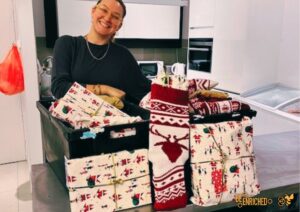
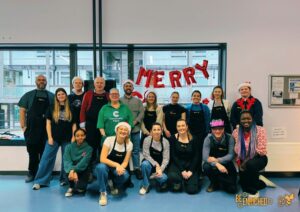
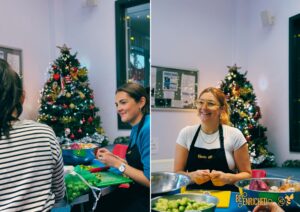

Spotlight Interview with Family Fund
Family Fund
Family Fund deliver grants for families raising a disabled or seriously ill child or young people on a low income across the UK.
- How are you helping to tackle child poverty in London?
Family Fund helps families across the UK who are raising disabled and seriously ill children and young people on low incomes, with grants, tailored information and support about financial issues, and benefits checks. We have grants for families with a child or young person aged up to 17, and for families with a young person living at home aged 18 to 24. Find out about our grants and services on our website.
- Tell us something you are excited about?
Right now we’re really excited about the growth of our information and support services. We’ve just launched our new Discover more support tool on our website. The tool is a searchable online database full of over 145 organisations who can support families raising disabled and seriously ill children on a low income. We are also running more free managing finances workshops online, and we’re exploring partnerships to deliver more free online support such as our iPad accessibility workshops with Guide Dogs. To keep up to date, find us on Facebook @familyfund
- Share with our members something positive about your organisation’s achievement or service?
We get lovely feedback about our online workshops.
“Education isn’t a one-size-fits-all, and we’ve found it hard to find activities that work with Joshua’s dyslexia. It feels like everything is either too academic or centred around sports. The workshop allowed Joshua to learn a new skill, use his creativity and have fun. It was perfectly catered to his interests, and as his parents, it was a huge relief for us to find something that he’d enjoy, that didn’t cost a penny.” Helen, mum of Joshua who attended our creative workshops over the summer holidays.
“I learnt a lot of new things, and the information provided was straightforward. I was taught how to use an online benefits calculator, where you input your details, and it tells you which benefits you’re entitled to. As a result, I discovered I was missing out on the Child Tax Credit element of my benefits. It’s through the Family Fund workshop that I realised that I’m entitled to more money.” Hilda, mum of Kalani, who attended our Checking your benefits online workshop.
- What can other network members learn from you or find out more about through you?
We always want to talk to organisations that support families on low incomes who are raising disabled or seriously ill children or young people. As a UK-wide pan-disability organisation working in all the nations of the UK we’re really well connected, involved in partnerships and coalitions working for change and representing families’ issues at a high level. So we can be a great networking resource for smaller, or regional and local-focussed organisations. We’ve been going 50 years, and we’re very careful in our partnership work, so families really trust the information we share with them.
- What would most help you achieve your goals?
Apart from more funding to be able to provide more grants, or better still an end to poverty and inequality, what would help us most would be being in touch with regional and local organisations so we can reach the families you work with.
- Why did you join 4in10? What do you enjoy about being part of the 4in10 network?
It’s great to be part of a network of organisations working in really practical ways to tackle the injustice of poverty that families in London face. It’s great to be part of the movement to make a difference.
If you would like to find out more about Family Fund please visit their website.








